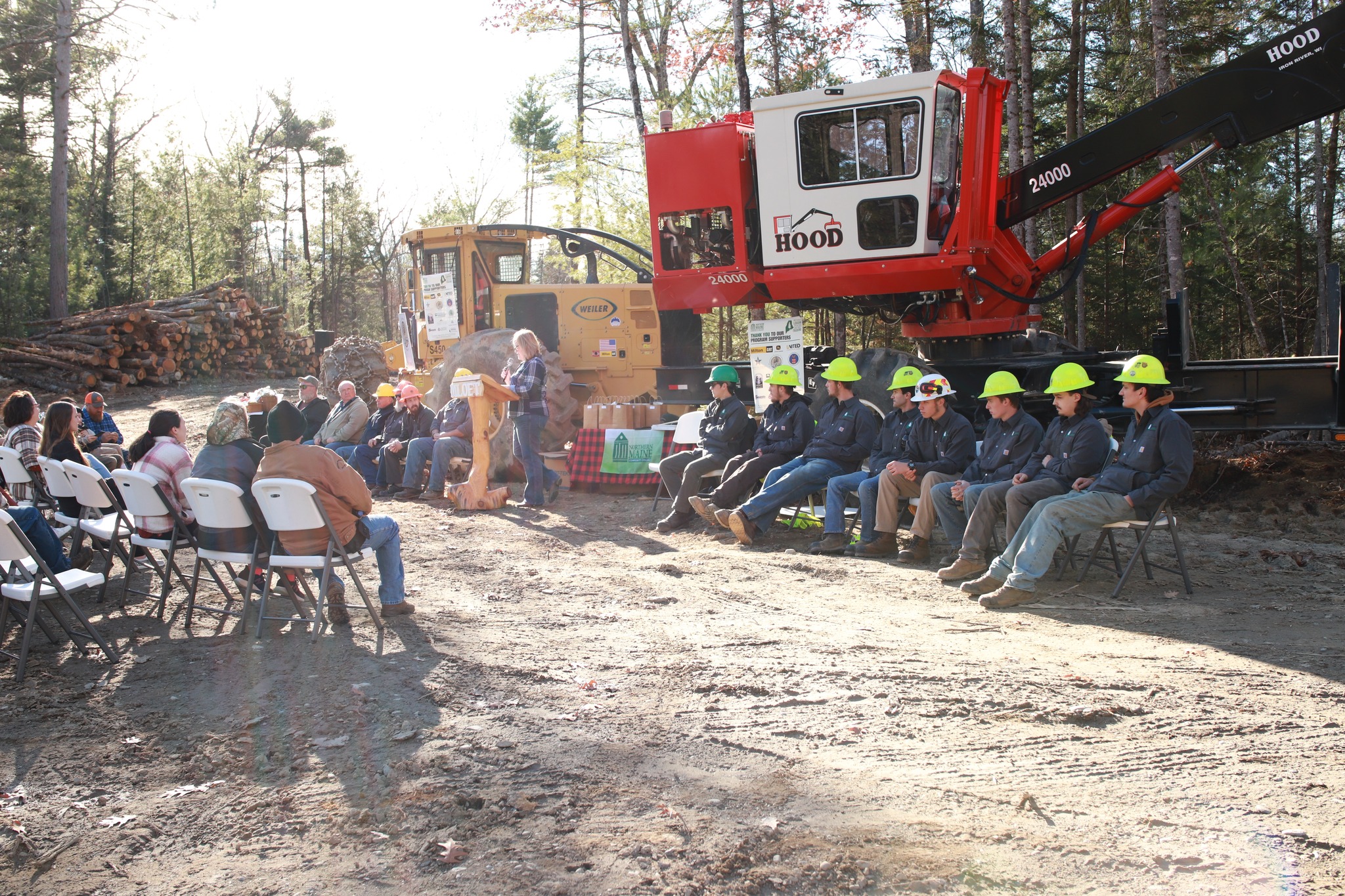Mechanized Logging Operations and Forest Trucking Program Graduation Thursday, Nov. 7
FAIRFIELD – Graduates of Maine’s only college training program for operators of mechanized logging and forest trucking equipment were recognized Nov. 7 at the site where they spent months harvesting timber using sophisticated state-of-the-art machines like those they will encounter in the logging industry.
Family members, friends, and many supporters of the 20-week Mechanized Logging Operations and Forest Trucking Program (MLOFT) joined students at the afternoon event at the Kennebec Valley Community College (KVCC) Alfond Campus in Fairfield.
The graduates included: Coltran Austin of Norridgewock; Ryan Bean of Troy; Connor Ennis of Millinocket; Daniel Higgins of Masardis; Andrew McDonough of Palmyra; Nick Rowe of New Vineyard; Benjamin Smith of Dexter; Dakota Sutherland of Ashland; Chance Tibbetts of Mercer; and Aliya Cox of Montville.
Chuck Ames, President of the Professional Logging Contractors of the Northeast (PLC), attended the event along with many PLC Members and thanked the many supporters and partners that have made the program possible, including Northern Maine Community College (NMCC), KVCC, Maine’s congressional delegation, and industry partners including Milton CAT, United Construction and Forestry, Davco, Wallingford’s Inc., Katahdin Fire Company, Acadia Insurance, MEMIC, the Maine Forest Service, AFM, and Skowhegan Savings Bank.
Ames congratulated the students on taking the initiative to both enroll in the program and see it through.
“We, the board members of the PLC, thank you the students, who took the initiative to enroll in this program and to join our logging community,” Ames said. “It is great that you took your whole summer off to learn how to be a logger, and hopefully you’ll all get a job doing what you like to do. My advice to you is to remember, when you’re young you always want to go 100 miles an hour, but remember, slow and steady wins the race.”
The program was created in 2017 by three Maine community colleges, the Professional Logging Contractors of Maine (now the Professional Logging Contractors of the Northeast), and industry partners. Dozens of graduates of the program currently work in the industry, and demand for additional logging and forest trucking operators in Maine is high and projected to remain so for the foreseeable future.
The students spent this summer and early fall harvesting timber at an active job site in the woods on the KVCC Alfond Campus Farm, gaining hands-on timber harvesting experience and benefiting from the guidance of veteran logging instructors for an educational experience that is unmatched by any other timber harvesting and hauling training program in Maine and neighboring states. Students also received hands-on experience operating commercial trucks, loading log trailers, and gaining knowledge critical to forest trucking. This year’s class is the second to have the opportunity to earn a CDL-A permit and receive preparation for the state driving exam.
The program is administered by Northern Maine Community College (NMCC) and includes a strong emphasis on safety as well as giving students an understanding of the variables of timber growth, tree species, and markets. Students pay no tuition or fees, and the program provides all personal protective equipment (PPE) and scholarships from Skowhegan Savings to assist with living expenses.
The project is funded entirely by a $1 million grant from the U.S. Department of Labor, Employment and Training Administration.
This year, as in past years, several students already have jobs waiting for them after graduation, and the addition of trucking to the program is welcomed by Maine’s logging industry, where demand for both drivers and logging operators exceeds supply.
Since the program began there have been more than 100 graduates, and 60 percent are still working in the industry.
Although consistently ranked as one of the most satisfying careers in the United States, logging is a challenging and demanding profession, and in Maine and elsewhere aging of the workforce and the costs of training new operators are threats to its future, making programs like MLOFT critical to meeting workforce demands.
In the Northeast, logging provides rural jobs and revenue for local and state governments as well as state and national forests. In Maine alone, the industry contributed an estimated $582 million to the state economy in 2021.


